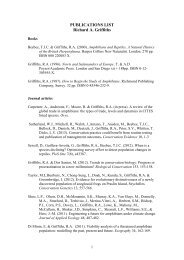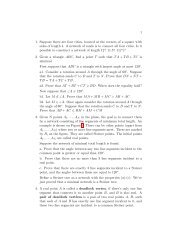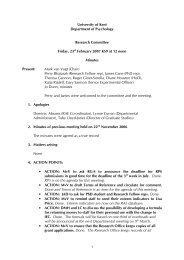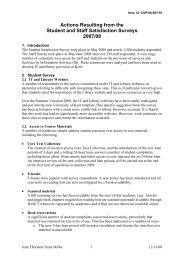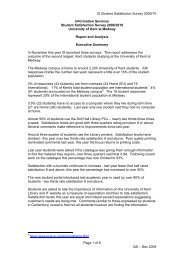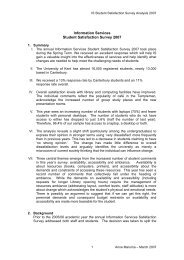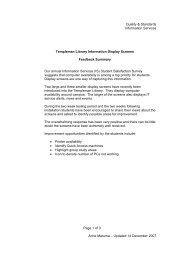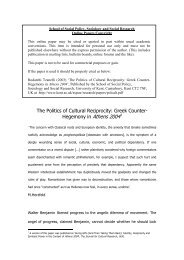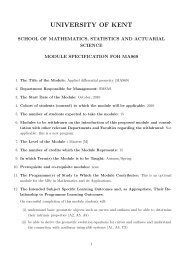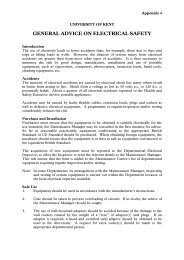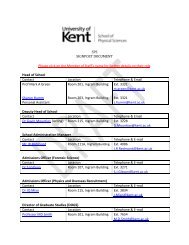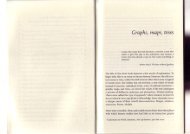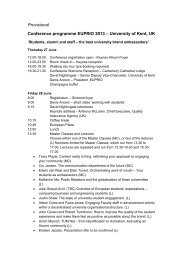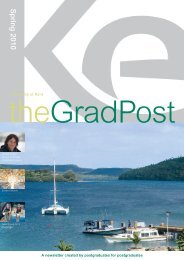The Magazine for the University of Kent
The Magazine for the University of Kent
The Magazine for the University of Kent
You also want an ePaper? Increase the reach of your titles
YUMPU automatically turns print PDFs into web optimized ePapers that Google loves.
KENT New Frontiers<br />
11<br />
to a successful generic technology <strong>for</strong><br />
<strong>the</strong> production <strong>of</strong> biopharmaceuticals<br />
and it was highlighted at a recent<br />
event, ‘Bioscience: Biomillions’, at HM<br />
Treasury, run by <strong>the</strong> Biotechnology and<br />
Biological Sciences Research Council.<br />
<strong>The</strong> research has a range <strong>of</strong> applications<br />
in biopharmaceuticals – medical drugs<br />
produced using biotechnology.<br />
Perfecting <strong>the</strong> pig<br />
Research by Kate Fowler, a PhD student<br />
at <strong>the</strong> Department <strong>of</strong> Biosciences, has<br />
provided a boost to pig producers wanting<br />
to tailor <strong>the</strong>ir animals to specific markets.<br />
Her research, which has been sponsored<br />
by JSR Genetics, aims to identify fat gene<br />
markers which will allow geneticists to<br />
predict how and when fat is laid down in<br />
<strong>the</strong> carcass. Kate Fowler described her<br />
research as being a natural progression to<br />
<strong>the</strong> mapping <strong>of</strong> <strong>the</strong> pig genome undertaken<br />
at <strong>the</strong> Roslin Institute in Edinburgh – and<br />
one that could lead to significant practical<br />
applications, including human health.<br />
Cultural memory conference<br />
A recent conference at <strong>the</strong> <strong>University</strong><br />
addressed <strong>the</strong> question <strong>of</strong> whe<strong>the</strong>r<br />
<strong>for</strong>getting is a necessary process which<br />
societies must undergo in order to<br />
progress. Keynote speakers at Cultural<br />
Memory: Forgetting to Remember/<br />
Remembering to Forget included Joseph<br />
Massad, Associate Pr<strong>of</strong>essor <strong>of</strong> Modern<br />
Arab Politics and Intellectual History,<br />
Columbia <strong>University</strong>, and Jay Winter,<br />
Pr<strong>of</strong>essor <strong>of</strong> History, Yale <strong>University</strong>.<br />
A fur<strong>the</strong>r 160 speakers from over<br />
20 countries worldwide represented<br />
disciplines such as anthropology,<br />
architecture, art history, English,<br />
European and world literature, film, fine<br />
art, history, philosophy, politics, sociology<br />
and <strong>the</strong>ology.<br />
<strong>The</strong> conference also considered how<br />
architects, filmmakers, video artists,<br />
fine artists, photographers, musicians<br />
and writers contribute to <strong>the</strong> process <strong>of</strong><br />
inventing, <strong>for</strong>getting and reinventing<br />
elements <strong>of</strong> national and cultural identity,<br />
and whe<strong>the</strong>r <strong>the</strong> social order is allowed to<br />
veil memories in order that society may<br />
survive by <strong>for</strong>getting. <strong>The</strong> conference also<br />
included a photography exhibition.<br />
‘Invisible’ history <strong>of</strong> mixed race<br />
A major new study, jointly undertaken<br />
by Peter Aspinall, Senior Research<br />
Fellow at <strong>the</strong> <strong>University</strong> <strong>of</strong> <strong>Kent</strong>, and<br />
Chamion Caballero, Senior Research<br />
Fellow at London South Bank <strong>University</strong>,<br />
will investigate who was considered to<br />
be mixed race in Britain between 1920<br />
and 1950, and how this population was<br />
perceived and treated by <strong>of</strong>ficialdom, <strong>the</strong><br />
media and wider society.<br />
<strong>The</strong> study uses first-hand accounts,<br />
autobiographical recordings and a range <strong>of</strong><br />
archival material to understand how <strong>the</strong>se<br />
perceptions emerged and <strong>the</strong> impact <strong>the</strong>y<br />
may have had on <strong>the</strong> conceptualisation <strong>of</strong><br />
mixed race people in Britain today.<br />
<strong>The</strong> project has already sourced some<br />
notable documents, including material at<br />
<strong>the</strong> National Archives on <strong>the</strong> repatriation<br />
<strong>of</strong> Liverpool Chinese seamen in 1946.<br />
According to Peter Aspinall, <strong>the</strong><br />
stigmatisation <strong>of</strong> mixed race people in<br />
Britain was at its peak during this time,<br />
a process to which many major institutions<br />
and significant public figures contributed.



